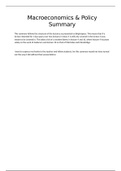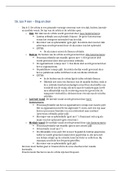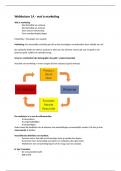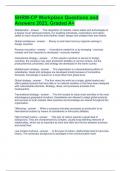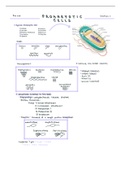ORGANISATIEKUNDE
,1 INHOUDSOPGAVE
1 introductie in de organisatiekunde ..................................................................................................................................... 4
1.1 evolutie................................................................................................................................................................................ 4
1.2 enkele inspirerende theorieën ............................................................................................................................................. 4
1.3 Soorten organisaties ........................................................................................................................................................... 7
1.3.1 volgens doel ................................................................................................................................................................ 7
1.3.2 volgens rechtspersoonlijkheid .................................................................................................................................... 7
2 doelen van een organisatie ................................................................................................................................................. 8
2.1 PDca-cirkel (william edwards deming) ................................................................................................................................ 8
2.2 beleidsplanning ................................................................................................................................................................... 8
2.3 missie, visie en kernwaarden .............................................................................................................................................. 8
2.3.1 mssie ........................................................................................................................................................................... 8
2.3.2 visie ............................................................................................................................................................................. 9
2.3.3 kernwaarden ............................................................................................................................................................... 9
2.4 omgevingsanalyse ............................................................................................................................................................... 9
2.4.1 inleiding ..................................................................................................................................................................... 10
2.4.2 profiel organisatie ..................................................................................................................................................... 10
2.4.3 interne omgeving ...................................................................................................................................................... 10
2.4.4 externe omgeving ..................................................................................................................................................... 11
2.4.5 belanghebbendennanalyse ....................................................................................................................................... 11
2.4.6 swot-analyse ............................................................................................................................................................. 12
2.4.7 confrontatiematrix .................................................................................................................................................... 12
2.5 doelstellingen .................................................................................................................................................................... 13
2.5.1 Kenmerken van goede doelstellingen: ...................................................................................................................... 13
2.5.2 smart formuleren ...................................................................................................................................................... 13
2.5.3 types .......................................................................................................................................................................... 14
2.5.4 soorten ...................................................................................................................................................................... 14
2.6 acties ................................................................................................................................................................................. 15
2.7 resultaten .......................................................................................................................................................................... 15
2.7.1 soorten indicatoren................................................................................................................................................... 16
2.7.2 ken- en stuurgetallen ................................................................................................................................................ 16
2.8 actieplan............................................................................................................................................................................ 16
2.8.1 mijlpalenplanning...................................................................................................................................................... 16
2.8.2 doelstellingenboom .................................................................................................................................................. 17
2.9 proces beleidsplanning ...................................................................................................................................................... 17
2.10 leidinggeven via doelstellingen ......................................................................................................................................... 19
3 organisatiestructuren ....................................................................................................................................................... 20
3.1 inleiding ............................................................................................................................................................................. 20
3.2 Structuur ........................................................................................................................................................................... 21
3.2.1 specialisatie ............................................................................................................................................................... 21
3.2.2 departementalisatie .................................................................................................................................................. 22
3.2.3 chain of command .................................................................................................................................................... 22
3.2.4 span of control .......................................................................................................................................................... 22
3.2.5 centralisatie of decentralisatie .................................................................................................................................. 23
2
, 3.2.6 formalisering ............................................................................................................................................................. 23
3.2.7 samenvatting structuur ............................................................................................................................................. 24
3.3 typologie van mintzberg ................................................................................................................................................... 24
3.3.1 eenvoudige organisatie ............................................................................................................................................. 25
3.3.2 bureaucratische organisatie ...................................................................................................................................... 26
3.3.3 professionele organisatie .......................................................................................................................................... 26
3.3.4 Divisie organisatie ..................................................................................................................................................... 27
3.3.5 innovatie organisatie................................................................................................................................................. 28
3.4 strucuren ........................................................................................................................................................................... 29
3.5 Evolutiestadia van een organisatie: groeimodel greiner................................................................................................... 30
3.5.1 fase 1: pioniersfase ................................................................................................................................................... 31
3.5.2 fase 2: managementfase ........................................................................................................................................... 31
3.5.3 fase 3: decentralisatiefase ........................................................................................................................................ 31
3.5.4 fase 4: Standaardisatiefase ....................................................................................................................................... 31
3.5.5 fase 5: samenwerkingsfase ....................................................................................................................................... 31
3.5.6 groei door ondernemen ............................................................................................................................................ 32
3.6 organisatiecultuur ............................................................................................................................................................. 32
3.6.1 inleiding ..................................................................................................................................................................... 32
3.7 soorten .............................................................................................................................................................................. 33
3.7.1 personencultuur ........................................................................................................................................................ 33
3.7.2 Taakcultuur ............................................................................................................................................................... 33
3.7.3 rolcultuur .................................................................................................................................................................. 33
3.7.4 machtscultuur ........................................................................................................................................................... 33
3
, 1 INTRODUCTIE IN DE ORGANISATIEKUNDE
1.1 EVOLUTIE
Vanaf de industriële revolutie is er nood aan het bestuderen van grotere organisaties (i.c. fabrieken). Vanaf eind 19 e eeuw
krijgen we dan ook een stroom aan publicaties binnen de organisatiekunde.
1.2 ENKELE INSPIRERENDE THEORIEËN
Kwantiatieve of rationele benadering Interdisciplinaire benadering Kwalitatieve of humanrelations
benadering
- wetenschappelijke benadering kwantitatieve (economie) en - aandacht voor het sociale aspect
- organisaties = gesloten systeem kwalitatieve (psychologie) benadering - organisatie = open systeem
met vaste regels en leveren synergievoordelen op - mens > verlengstuk van machine
doelstellingen (vooral vandaag) - groepsdynamiek draagt bij tot
- vooral gericht op efficiëntie: betere prestaties
taakomschrijving, tijdsmeting - betrokkenheid,
medezeggenschap, delegatie, …
Kwantiatieve of rationele benadering
Context
- Fabrieken werden groter
- Stoommachines deden werktuigen sneller draaien -> grotere hoeveelheden
- Betere scheikundige kennis en ontginning steenkoolmijnen -> goedkoop en kwalitatief staal produceren ->
machinebouw en beter mechanisatie
- Verbetering elektriciteit -> elektromotoren als aandrijving en betere ver
- Hogere productie
- Nieuwe producten
- Nieuwe consument
4
,1 INHOUDSOPGAVE
1 introductie in de organisatiekunde ..................................................................................................................................... 4
1.1 evolutie................................................................................................................................................................................ 4
1.2 enkele inspirerende theorieën ............................................................................................................................................. 4
1.3 Soorten organisaties ........................................................................................................................................................... 7
1.3.1 volgens doel ................................................................................................................................................................ 7
1.3.2 volgens rechtspersoonlijkheid .................................................................................................................................... 7
2 doelen van een organisatie ................................................................................................................................................. 8
2.1 PDca-cirkel (william edwards deming) ................................................................................................................................ 8
2.2 beleidsplanning ................................................................................................................................................................... 8
2.3 missie, visie en kernwaarden .............................................................................................................................................. 8
2.3.1 mssie ........................................................................................................................................................................... 8
2.3.2 visie ............................................................................................................................................................................. 9
2.3.3 kernwaarden ............................................................................................................................................................... 9
2.4 omgevingsanalyse ............................................................................................................................................................... 9
2.4.1 inleiding ..................................................................................................................................................................... 10
2.4.2 profiel organisatie ..................................................................................................................................................... 10
2.4.3 interne omgeving ...................................................................................................................................................... 10
2.4.4 externe omgeving ..................................................................................................................................................... 11
2.4.5 belanghebbendennanalyse ....................................................................................................................................... 11
2.4.6 swot-analyse ............................................................................................................................................................. 12
2.4.7 confrontatiematrix .................................................................................................................................................... 12
2.5 doelstellingen .................................................................................................................................................................... 13
2.5.1 Kenmerken van goede doelstellingen: ...................................................................................................................... 13
2.5.2 smart formuleren ...................................................................................................................................................... 13
2.5.3 types .......................................................................................................................................................................... 14
2.5.4 soorten ...................................................................................................................................................................... 14
2.6 acties ................................................................................................................................................................................. 15
2.7 resultaten .......................................................................................................................................................................... 15
2.7.1 soorten indicatoren................................................................................................................................................... 16
2.7.2 ken- en stuurgetallen ................................................................................................................................................ 16
2.8 actieplan............................................................................................................................................................................ 16
2.8.1 mijlpalenplanning...................................................................................................................................................... 16
2.8.2 doelstellingenboom .................................................................................................................................................. 17
2.9 proces beleidsplanning ...................................................................................................................................................... 17
2.10 leidinggeven via doelstellingen ......................................................................................................................................... 19
3 organisatiestructuren ....................................................................................................................................................... 20
3.1 inleiding ............................................................................................................................................................................. 20
3.2 Structuur ........................................................................................................................................................................... 21
3.2.1 specialisatie ............................................................................................................................................................... 21
3.2.2 departementalisatie .................................................................................................................................................. 22
3.2.3 chain of command .................................................................................................................................................... 22
3.2.4 span of control .......................................................................................................................................................... 22
3.2.5 centralisatie of decentralisatie .................................................................................................................................. 23
2
, 3.2.6 formalisering ............................................................................................................................................................. 23
3.2.7 samenvatting structuur ............................................................................................................................................. 24
3.3 typologie van mintzberg ................................................................................................................................................... 24
3.3.1 eenvoudige organisatie ............................................................................................................................................. 25
3.3.2 bureaucratische organisatie ...................................................................................................................................... 26
3.3.3 professionele organisatie .......................................................................................................................................... 26
3.3.4 Divisie organisatie ..................................................................................................................................................... 27
3.3.5 innovatie organisatie................................................................................................................................................. 28
3.4 strucuren ........................................................................................................................................................................... 29
3.5 Evolutiestadia van een organisatie: groeimodel greiner................................................................................................... 30
3.5.1 fase 1: pioniersfase ................................................................................................................................................... 31
3.5.2 fase 2: managementfase ........................................................................................................................................... 31
3.5.3 fase 3: decentralisatiefase ........................................................................................................................................ 31
3.5.4 fase 4: Standaardisatiefase ....................................................................................................................................... 31
3.5.5 fase 5: samenwerkingsfase ....................................................................................................................................... 31
3.5.6 groei door ondernemen ............................................................................................................................................ 32
3.6 organisatiecultuur ............................................................................................................................................................. 32
3.6.1 inleiding ..................................................................................................................................................................... 32
3.7 soorten .............................................................................................................................................................................. 33
3.7.1 personencultuur ........................................................................................................................................................ 33
3.7.2 Taakcultuur ............................................................................................................................................................... 33
3.7.3 rolcultuur .................................................................................................................................................................. 33
3.7.4 machtscultuur ........................................................................................................................................................... 33
3
, 1 INTRODUCTIE IN DE ORGANISATIEKUNDE
1.1 EVOLUTIE
Vanaf de industriële revolutie is er nood aan het bestuderen van grotere organisaties (i.c. fabrieken). Vanaf eind 19 e eeuw
krijgen we dan ook een stroom aan publicaties binnen de organisatiekunde.
1.2 ENKELE INSPIRERENDE THEORIEËN
Kwantiatieve of rationele benadering Interdisciplinaire benadering Kwalitatieve of humanrelations
benadering
- wetenschappelijke benadering kwantitatieve (economie) en - aandacht voor het sociale aspect
- organisaties = gesloten systeem kwalitatieve (psychologie) benadering - organisatie = open systeem
met vaste regels en leveren synergievoordelen op - mens > verlengstuk van machine
doelstellingen (vooral vandaag) - groepsdynamiek draagt bij tot
- vooral gericht op efficiëntie: betere prestaties
taakomschrijving, tijdsmeting - betrokkenheid,
medezeggenschap, delegatie, …
Kwantiatieve of rationele benadering
Context
- Fabrieken werden groter
- Stoommachines deden werktuigen sneller draaien -> grotere hoeveelheden
- Betere scheikundige kennis en ontginning steenkoolmijnen -> goedkoop en kwalitatief staal produceren ->
machinebouw en beter mechanisatie
- Verbetering elektriciteit -> elektromotoren als aandrijving en betere ver
- Hogere productie
- Nieuwe producten
- Nieuwe consument
4




